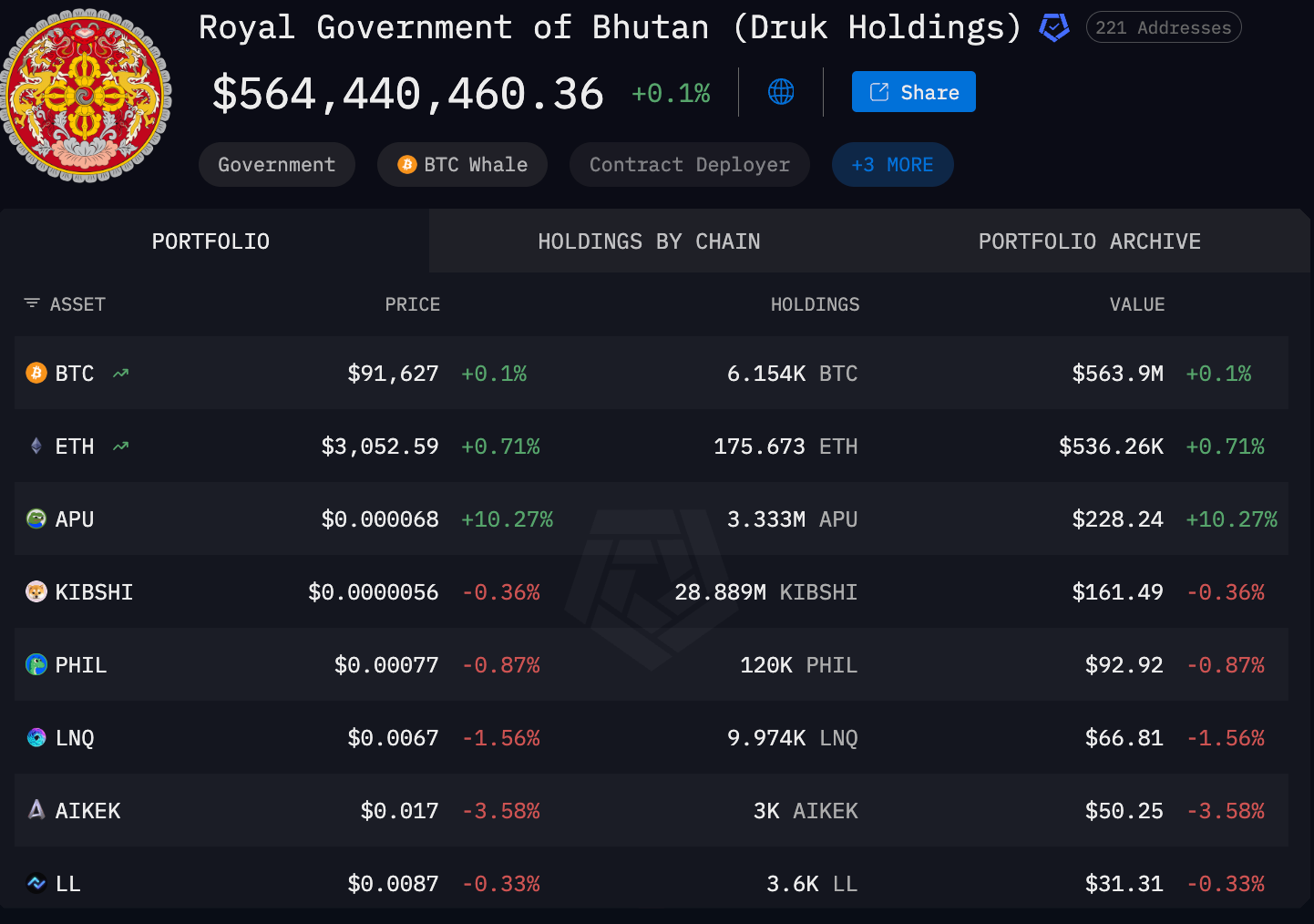Arkham Intelligence data shows that the Royal Government of Bhutan has put 320 Ether (ETH), worth about $970,000, on Figment, which has set up ten new Ethereum validators under state control. The transaction happened on November 27, which was the start of a new phase in Bhutan's government-led blockchain strategy.
Figment is a staking provider that enables institutional clients to earn network rewards by securing proof‑of‑stake blockchains. Bhutan’s move allows the Himalayan nation to become a direct participant in Ethereum’s consensus process. The government now earns yields estimated between 3% and 5% annually, which translates to roughly $30,000 to $50,000 in potential annual returns.
The address identified as belonging to the Royal Government of Bhutan was tracked by multiple blockchain analytics platforms, confirming the stake through Figment infrastructure. Public records show that the same wallet still holds almost $1 million in ETH that hasn't been staked, which suggests that the program may grow in the future.

Expanding the country’s blockchain footprint
Bhutan’s latest move follows a series of initiatives aimed at integrating blockchain into its wider economic and digital framework. The government started to mine Bitcoin in 2019 by leveraging its abundant hydropower resources. According to on‑chain data compiled by BitcoinTreasuries, Bhutan currently holds about 6,154 BTC, worth over $562 million at recent market prices.
Earlier this year, Bhutan also enabled cryptocurrency payments for tourists through a partnership with Binance. Nearly 1,000 merchants across the nation now accept Bitcoin and Ethereum, making it easier for travelers to transact digitally. This initiative supports Bhutan’s tourism sector, which contributes roughly 6% of national GDP, and reflects its intent to modernize commerce through blockchain systems.
At the same time, Bhutan is pursuing digital sovereignty by moving its national identity system from Polygon to Ethereum. The migration began in October, with Vitalik Buterin and Ethereum Foundation President Aya Miyaguchi attending the launch event alongside Bhutan’s Prime Minister Tshering Tobgay. According to Miyaguchi, all resident credentials will be migrated by early 2026.
This digital ID transition aims to create a transparent, and secure identity layer built on public blockchain infrastructure. By aligning state‑level identity management with decentralized technology, Bhutan is positioning itself as a pioneer in blockchain‑based governance.
Why the Ethereum validators matter
The ten new Ethereum validators operated by Bhutan reinforce the network’s decentralization and align with the country’s sustainable development goals. Staking is different from traditional reserve holdings because it combines financial returns with active participation in network validation.
By engaging in validator operations, Bhutan supports Ethereum’s efficiency and long‑term resilience. The network’s proof‑of‑stake design allows participants to earn rewards without arbitrary energy waste, matching Bhutan’s renewable energy strategy that powers its Bitcoin mining facilities.
For a nation of about 800,000 people, participation at the protocol level demonstrates a direct alignment between digital policy and economic diversification. The validator nodes not only generate passive revenue for the government but also establish a foundation for further blockchain‑based services inside Bhutan’s public infrastructure.
Digital identity and blockchain sovereignty
Bhutan’s decision to host its identity system and validator activity on Ethereum reflects an emphasis on transparency, interoperability, and resilience. Strategic adoption of a public blockchain ensures auditability while reducing dependence on external intermediaries or proprietary databases.
By anchoring key state functionality on Ethereum, Bhutan moves beyond passive asset management. Its initiatives now encompass operational participation in the digital economy, a model that contrasts with other sovereign crypto holdings limited to storage or speculation.
The government’s validator operations through Figment convey a signal of confidence in the Ethereum infrastructure. The choice of Figment, a provider widely used by institutional clients, ensures reliability and compliance at scale.
With this step, Bhutan confirms that its blockchain policy integrates financial management and long‑term national planning. The coordinated effort to mine Bitcoin, make crypto payments possible, start validators and identity systems, and more shows that the government is open to digital innovation on a rare level.
As Bhutan extends its on‑chain presence, the small Himalayan kingdom positions itself among the foremost state actors actively building on blockchain rather than merely holding speculative assets.

Disclaimer: All materials on this site are for informational purposes only. None of the material should be interpreted as investment advice. Please note that despite the nature of much of the material created and hosted on this website, HODL FM is not a financial reference resource, and the opinions of authors and other contributors are their own and should not be taken as financial advice. If you require advice. HODL FM strongly recommends contacting a qualified industry professional.





